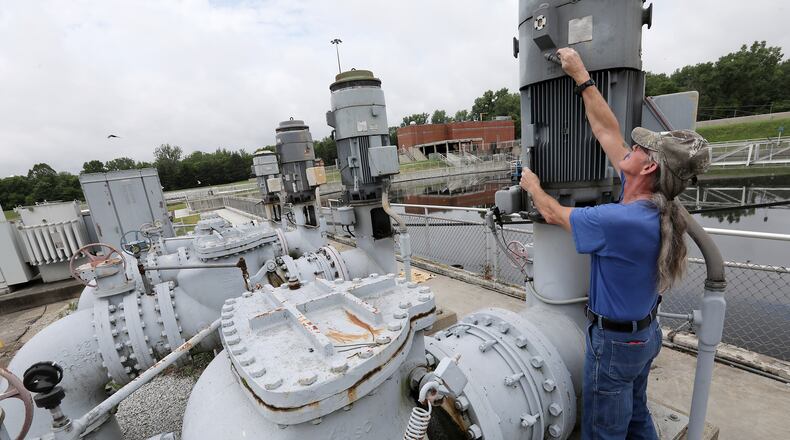“We have not had to employ reserves or federal relief funds to address inflationary prices,” said Valerie Lough, the Community Information Coordinator for Springfield, in an email to this news organization.
Both Springfield and Clark County officials say that inflation is driving up the prices of some frequently purchased materials and in some cases those costs have increased by more than 150%.
That includes materials used in Springfield’s Water Treatment and Wastewater Treatment plants as well as a rise in construction material used in Clark County infrastructure projects.
There has also been an almost 67% increase in the price of diesel and a 50% increase in the cost of unleaded gasoline used by Springfield city vehicles.
Despite having to absorb higher costs, the city has been able to manage the influx in prices.
“The rise in prices, shortage of labor and other matters complicated by the COVID-19 pandemic have taken a toll on everyone in our community,” said Springfield City Manager Bryan Heck. “While we as the city government have experienced similar difficulties, we haven’t had to make impactful financial choices at this time. We do our best to make frugal, fiscally-sound decisions in service to the community, and will continue to do so.”
Inflation is having a larger impact on the supplier level. Information provided by the U.S. Department of Labor shows that inflation for consumer products sits around 8%, per the Consumer Price Index, but the producer price index, which measures inflation at the supplier level before it reaches consumers, is 11.2% as of March.
The vast majority of American purchasing is at the business level, and inputs to production in general are rising faster than consumer goods, said Kevin Willardsen, professor of economics at Wright State University.
Springfield city officials said that impacts of the inflation will be long-term.
“We continue to be judicious when it comes to expenditures and mindful of rising costs,” said Mark Beckdahl, the finance director for the city of Springfield. “Inflation has a long-term impact, so we are being prudent in the decisions we make now with an eye on the future.”
But the rising costs in materials can also impact contractors used by the city and other local governmental entities to work on projects or provide services. Due to the inflation and the unpredictability in prices, some of those contractors are hesitant to enter into a contract that lasts longer than three months, stated a recent news release from the city of Springfield.
“Typically, we strike contracts for one year, with two one-year options to renew,” said Beckdahl.
The costs of some contracted services have also increased due to inflation, said Springfield Service Director Chris Moore. Contract street sweeping prices rose by 25% in 2022 compared to 2021, and contract mowing prices rose 18%, the release stated.
Federal coronavirus relief money also complicates things. The CARES Act and American Rescue Plan Act afforded local governments millions to spend on infrastructure projects, with directives to spend or allocate it by 2026. The subsequent surge in demand for construction services means contractors can pick and choose which projects to take on.
“Contractors are getting calls saying, ‘Hey come do this work, and send the bill afterwards,” said John Morris, President of the Ohio Valley Associated Builders and Contractors.
Contractors are also less likely to pick public sector projects because of their fixed bidding structure, Morris said.
In a government contract, a contractor often has to assume 100% of the risk because it’s a fixed price, and so contractors often charge more to accommodate for factors of uncertainty, Morris said. In the private sector, entities share more risk. Contracts are more flexible, and prices may go up or down.
Clark County Engineer John Burr said that prices have increased for construction materials used in county projects such as concrete and asphalt, the latter has seen bids for that product go from about $70 per ton last year to a little more than $100 per ton this year.
That has limited the amount of asphalt that the county can purchase or has increased the costs of projects such as road repaving, street widening or adding a roundabout.
For major road projects undertaken by the county, about 80% of those cost are covered by the Ohio Department of Transportation (ODOT), Burr said.
But, additional costs that surpasses ODOT’s pledge of funds that are brought on by rising material or contractor prices would have to be either covered by the county or by other funding sources, Burr added.
The impacts of inflation on contractors has caused some road projects to be delayed. Asphalt work at the Springfield-Beckley Municipal Airport has also been delayed, said Seth Timmerman, the airport’s manager. The delay is attributed to a lack of available contractors. A shortage of labor and other price increases pushed bids for that project over the budget, Springfield officials stated.
The airport did receive two grants for projects, one from ODOT, the other from the Federal Aviation Administration (FAA).
“We only received one bid for each project, and both came in over budget, one by nearly $2 million,” Timmerman said . “It is very uncommon to have only one contractor bid on projects like these.”
But, both projects are expected to move ahead and Timmerman said that they are working with ODOT and the FAA to find solutions.
About the Author

